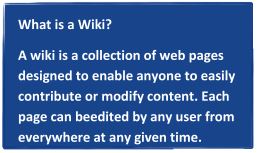What is a Wiki?
A Wiki is...
A wiki is a page or collection of web pages designed to enable anyone who accesses it to contribute or modify content, using a simplified markup language. At its core, a wiki is a simple online database in which each page is easily edited by any user with a Web browser; no special software or third party webmaster is needed to post content. It also allows for linking among any number of pages.
Each article contains a discussion page where editors and readers can talk about the document. By looking at the history of a page, users can track changes and compare the versions of a document. This ease of interaction and operation makes a wiki an effective tool for collaborative writing .
A wiki's versioning capability can show the evolution of thought processes as contributors interact with content, helping us to focus more on content and less on who is contributing what. This can be a big culture change. It takes a while to get used to the idea that someone else can change what you wrote. But that also means they can IMPROVE it! So it is a bit like thinking together. Obsolete material needs to be removed.
Wikis are often used to create collaborative websites and to power community websites. The pages within a wiki can and should be linked to other relevant pages within and/or outside the wiki. The collaborative encyclopedia Wikipedia is one of the best-known wikis. Wikis are used in business to provide intranet and knowledge management systems. Ward Cunningham, the developer of the first wiki software, WikiWikiWeb, originally described it as "the simplest online database that could possibly work". He was looking for the simplest possible tool to help a group of people share information they were using in a collaborative project.
By the way, "wiki" is a Hawaiian word for "fast".
Why should I use this?
The intention is to replace long monolithic documents by small -linked- information units. This makes it easier to navigate through large documents and find wanted information and further information.
Editing an article within a wiki is easy. This allows the wiki-users to keep information up to date, to correct articles published by other users or to add more relevant information to it by adding text or linking an other relevant article, or explanation.
It is for example not necessary to explain in detail what options and strategies there are in solar cooking in different documents if it has been defined once and is now linked to the text. This prevents redundancy and allows users to concentrate on the topic ore to gain more surrounding information - as he or she likes.
If a page with specific content is linked to several pages, and the specific content is one that changes over time, the information must only be updated in one single document instead of all documents where it occurs. So if there were new technologies in solar cooking they could just be added to the document that already exists and the information would be available from all the documents that it is linked to.
More reasons for using wikis arise from the needs of knowledge- and project- management.
Besides storing and providing information a wiki can be used as a tool for knowledge generation and allocation as well as a project planning tool. It also makes it possible for external personnel to access this information and see how the project proceeds.
When to use a wiki?
People often have only one model of wiki practices from the most globally visible wiki, Wikipedia an encyclopedia built and used by many people. You can edit the Wikipedia. Anyone can. But an encyclopedia is just one use for a wiki.
Furthermore, you can use a wiki ...
- For collaborative writing - When you have to write a report with others, especially people who don’t work in the same location as you? Wikis allow a team to write together and see their shared work all along the way.
- As a collaboration tool - Instantly collaborate without emailing documents, keeping the group in sync.
- Action plan or monthly updates
- Shared “to do” list
- Checklists
- Capture notes, snippets and resources for a project or report
- As a meeting tool - collaboratively prepare agendas, take notes and share additional resources. Can also help those not at a F2F meeting have access to some meeting materials.
- Shared agenda creation
- Shared note taking
- Distribution of minutes/action items
- Translate materials
- Learning and training
- For content creation and management
- Wiki as index for a file library
- Create a process manual
- Create FAQs (Frequently Asked Questions)
Wiki Weaknesses
- Must be online to edit or read a page. You can however download the relevant article as a pdf file. Thus, it is not a good tool for people who have to write together but aren’t often online.
- Can get messy if you don’t have a practice of “wiki gardening.” If you make a lot of pages, for example, and don’t link them to other pages, they become hard to find or “orphaned.” If people don’t delete out of date text, a page becomes useless.
- Does not emphasize who wrote what and when, so if that is important, a wiki may not be a good choice. In a wiki, the focus is on the content, rather than who wrote it or when they wrote it.





















